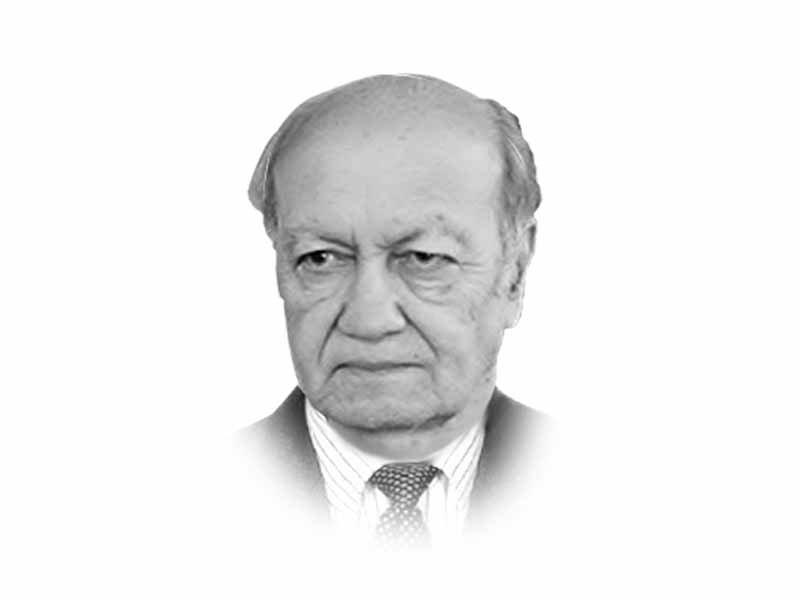
The security establishment, for long, has cooperated with the drone programme. We were initially told that drones were being used with Pakistan’s approval. During General (retd) Musharraf’s rule, we had a base in Quetta, which was used by the Americans to operate drones and target both Pakistani and Afghan militants. Later, when we realised the folly of compromising our sovereignty so openly, the CIA shifted the drone complex to Afghanistan but continued to strike Pakistani targets. Our Foreign Office and more so the establishment did protest against such strikes, but this was more a formality. In fact, there was within the security community some who saw clear benefits of drone strikes in our fight against terrorism. I will not be surprised if there are those among the establishment, who still find the use of drones valuable, provided they are fired with our consent at TTP leaders hiding in Fata or in Afghanistan. Irrespective of any tactical benefits, drone strikes are a gross compromise of our sovereignty and if we are to accept them, a clear policy needs to be publicly enunciated. It would be advisable if the Committee on National Security or the Defence Committee of the Cabinet holds a special session on the subject of drone strikes and makes its position implicit, defining clearly the follow-up in case of another violation.
Simultaneously, we must address the other enigma that weakens our position in the eyes of the international community — the freedom of movement and the safe sanctuary that Mullah Mansoor and other Taliban shura members enjoyed and still continue to enjoy in Pakistan. However much we may want to convince the world that we were not aware of the Taliban chief’s comings and goings, we lack credibility. It is not that we underrate the intelligence agencies of foreign countries, as they know a lot of what is happening in Pakistan. It is also not that we are not aware of the Afghan government’s sensitivities either. But we still hope to develop strong ties with it and simultaneously use the special relationship with the Taliban and the Haqqanis, hoping to further leverage it. This diplomatic manoeuvre has not worked in the past and is unlikely to succeed in the future. Nothing would suit India more than the continuation of this contradiction for it helps in drawing Afghanistan closer to it and deepening Afghan hostility toward us. The same dynamic is replicated in our relations with the US. The adverse consequences of supporting the Afghan Taliban in our internal fight against the TTP and other militant groups, especially at the ideological level is never a subject of our national discussion. In brief, the support of the Taliban has come at a huge cost to Pakistan and no one seems to have done a serious analysis of this, apart from the illusory belief that they will act as a bulwark against India’s growing influence in Afghanistan. This is not to suggest that we take sides and invite Taliban hostility. We need to genuinely implement the policy that our political and military leaderships have defined in simplistic terms — “Afghan led and Afghan owned” — but regrettably, this has never truly been accepted for its fidelity by the Afghans or the Americans. It is also doubtful if the Afghan government is presently in a position to negotiate a deal on its own with the Taliban without international support. Pakistan finds itself in a difficult situation, with the Taliban on the offensive and not amenable to negotiations and the Afghan government not trusting us. In this situation, the best option would be to ease out the Taliban leadership from Pakistan and let events take their course in Afghanistan. Simultaneously, we must strengthen border management to prevent any adverse fallout. Pakistan’s focus mostly has been to develop close relations with Pakhtuns. This is natural due to the presence on both sides of the border of a large Pakhtun population. We should broaden our base and give equal priority to ties with the Tajiks and Uzbeks. More importantly, we should support the government in Kabul to regain its lost trust. Deep distrust within the Afghan people about Pakistan has to be addressed through bold confidence-building measures. More frequent visits of the prime minister and the army chief to Afghanistan and reciprocal visits to Pakistan should help in regaining confidence and trust. This should be accompanied by exploring avenues for enhancing trade and commerce.
Afghanistan, too, must stop supporting the TTP and militant groups opposed to Pakistan. Its intelligence and security agencies should not view Pakistan through the Indian lens. Pakistan and the US need to engage more frequently and seriously to discuss Afghanistan to reduce misgivings and refrain from making accusations. Ensuring Pakistan’s national interest will require an appreciation of the prospects offered by developing a mutually trusting relationship with Afghanistan by expanding economic, political and cultural links, and using these as a springboard for regional cooperation.
Published in The Express Tribune, June 8th, 2016.
Like Opinion & Editorial on Facebook, follow @ETOpEd on Twitter to receive all updates on all our daily pieces.












COMMENTS (21)
Comments are moderated and generally will be posted if they are on-topic and not abusive.
For more information, please see our Comments FAQ